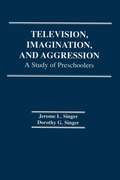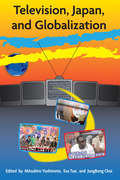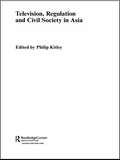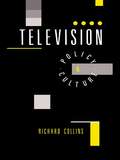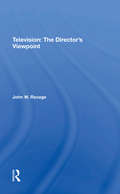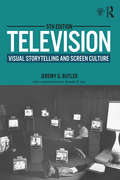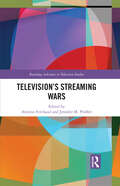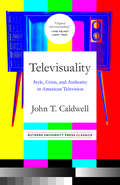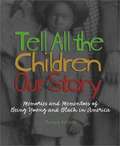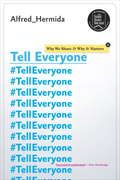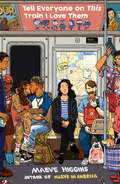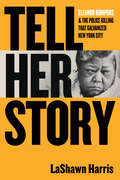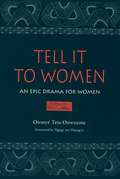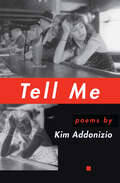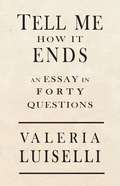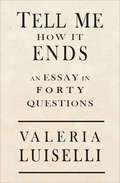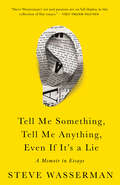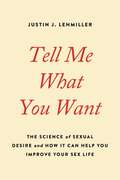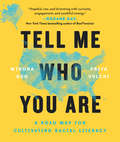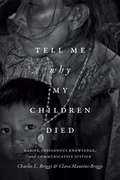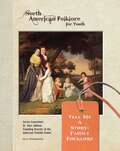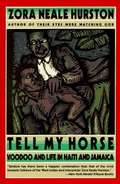- Table View
- List View
Television, Imagination, and Aggression: A Study of Preschoolers
by D. G. SingerFirst Published in 1981. Routledge is an imprint of Taylor & Francis, an informa company.
Television, Japan, and Globalization
by Jungbong Choi Eva Tsai Mitsuhiro YoshimotoMichigan Monograph Series in Japanese Studies No. 67 Television, Japan, and Globalization is a collection of essays that describe vivid and compelling examples of Japanese media and analyze them with sophisticated theoretical methods. The book makes a stunning contribution to the literature of television studies, which has increasingly recognized its problematic focus on U.S. and Western European media, and a compelling intervention in discussions of globalization, through its careful attention to contradictory and complex phenomena on Japanese TV. Case studies include talent and stars, romance, anime, telops, game/talk shows, and live action nostalgia shows. The book also looks at Japanese television from a political and economic perspective, with attention to Sky TV, production trends, and Fuji TV as an architectural presence in Tokyo. The combination of textual analysis, brilliant argument, and historical and economic context makes this book ideal for media studies audiences. Its most important contribution may be the way these essays move the study of Japanese popular culture beyond the tired truisms about postmodernism and open up new lines of thinking about television and popular culture within and between nations.
Television, Regulation and Civil Society in Asia
by Philip KitleyThis highly topical book exposes the tensions between state policies of broadcasting regulation and practices of civil society in the Asian region which is struggling with its incorporation into a new globalised, electronic information and entertainment world. Kitley critically compares Western principles of broadcasting, civil society and cultural regulation with alternative 'Asian' practices of regulation and organisation. Over the past forty years Asian states have used television as a normative cultural force in nation building, but more recently many states have deregulated their television sectors and introduced national commercial and international satellite services. As Asian states wrestle with a perceived loss of cultural control and identity through deregulation, this book considers their viewpoints and the question of whether the television public sphere offers space for the representation of popular sovereignty, and transversal concerns about human rights, press freedom, gender, environmental and world trade issues.
Television: Policy and Culture
by Richard CollinsIn this important and wide-ranging text, Richard Collins combines original research with provocative analysis and argument. He focuses on the impact of new television technologies, national policies for television for television in North America and Europe, the effects of internationalisation, television news and documentaries and the history and likely development of media studies.
Television: Technology and Cultural Form (Routledge Classics)
by Raymond WilliamsTelevision: Technology and Cultural Form was first published in 1974, long before the dawn of multi-channel TV, or the reality and celebrity shows that now pack the schedules. Yet Williams' analysis of television's history, its institutions, programmes and practices, and its future prospects, remains remarkably prescient. Williams stresses the importance of technology in shaping the cultural form of television, while always resisting the determinism of McLuhan's dictum that 'the medium is the message'. If the medium really is the message, Williams asks, what is left for us to do or say? Williams argues that, on the contrary, we as viewers have the power to disturb, disrupt and to distract the otherwise cold logic of history and technology - not just because television is part of the fabric of our daily lives, but because new technologies continue to offer opportunities, momentarily outside the sway of transnational corporations or the grasp of media moguls, for new forms of self and political expression.
Television: The Director's Viewpoint
by John W. Ravage Jack RavageTelevision directors remain an enigma to most students of the mass media; traditionally, their function has been little understood by scholars and the viewing public. In this book, John Ravage studies the role of the director in the producer-dominated medium of commercial television. Built around lengthy interviews with twelve of the leading directors of commercial programs—representing all the genres of "prime time"—the book analyzes the major issues facing television, its past, present, and portents for the future, and the audience that watches it.
Television: Visual Storytelling and Screen Culture (Routledge Communication Ser.)
by Jeremy G. ButlerFor over two decades, Television has served as the foremost guide to television studies, offering readers an in-depth understanding of how television programs and commercials are made and how they function as producers of meaning. Author Jeremy G. Butler shows the ways in which camera style, lighting, set design, editing, and sound combine to produce meanings that viewers take away from their television experience. Highlights of the fifth edition include: An entirely new chapter by Amanda D. Lotz on television in the contemporary digital media environment. Discussions integrated throughout on the latest developments in screen culture during the on-demand era—including the impact of binge-watching and the proliferation of screens (smartphones, tablets, computer monitors, etc.). Updates on the effects of new digital technologies on TV style.
Television’s Streaming Wars (Routledge Advances in Television Studies)
by Arienne Ferchaud Jennifer M. ProffittThis volume addresses contemporary debates and trends regarding the production and distribution, content, and audience engagement with the television streaming industry. The book interrogates the economics and structure of the industry, questions the types and diversity of content perpetuated on streaming services, and addresses how audiences engage with content from US and global perspectives and within various research paradigms. Chapters address television streaming wars, including the debates and trends in terms of its production and competition, diversity and growth of programming, and audience consumption, focusing on multiple platforms, content, and users. This timely and creative volume will interest students and scholars working in television studies, media industry studies, popular culture studies, audience studies, media psychology, critical cultural studies and media economics.
Televisuality: Style, Crisis, and Authority in American Television (Communications, Media, and Culture Series)
by John T CaldwellAlthough the "decline" of network television in the face of cable programming was an institutional crisis of television history, John Caldwell's classic volume Televisuality reveals that this decline spawned a flurry of new production initiatives to reassert network authority. Television in the 1980s hyped an extensive array of exhibitionist practices to raise the prime-time marquee above the multi-channel flow. Televisuality demonstrates the cultural logic of stylistic exhibitionism in everything from prestige series (Northern Exposure) and "loss-leader" event-status programming (War and Remembrance) to lower "trash" and "tabloid" forms (Pee-Wee's Playhouse and reality TV). Caldwell shows how "import-auteurs" like Oliver Stone and David Lynch were stylized for prime time as videographics packaged and tamed crisis news coverage. By drawing on production experience and critical and cultural analysis, and by tying technologies to aesthetics and ideology, Televisuality is a powerful call for desegregation of theory and practice in media scholarship and an end to the willful blindness of "high theory."
Tell All The Children Our Story: Memories and Mementos of Being Young and Black in America
by Tonya BoldenIn a warm, personal voice, Tonya Bolden explores what it has meant to be young and black in America. From the first recorded birth of a black child in Jamestown, through the Revolution, the Civil War, Reconstruction, and the fight for civil rights, right on up to our own time, Bolden brings to light how black children have worked and played, suffered and rejoiced.
Tell Everyone
by Alfred HermidaIdeas and stories that would once only reach a handful of people can now reverberate across the world, amplifying the power of individuals, informing our choices, and changing how we receive and react to the news. Tell Everyone explores and explains a more open, vibrant and diverse media Every day more than 500 million messages are sent on Twitter, 800 million people share four billion stories, links, photographs and videos on Facebook. Every minute, 100 hours of video is uploaded to YouTube. And the flow is ever-increasing. In this new era of media saturation, what do we mean by "the news"? Is "the most trusted name in news" today a veteran anchor on television or an undergraduate tweeting from Tahrir Square in Cairo? The day before yesterday, news and information was scarce, coming from a few newspapers or broadcasters. Now, not only are we able to connect and collaborate to create our own media, but for the first time have access to a global audience. Together we can help to bring down governments or chasten international corporations. We can hasten the spread of gossip, rumour and lies. We can market our products more widely and efficiently than ever--if we take the trouble to discover why people share and to whom. In this groundbreaking work, online news pioneer and social media maven Alfred Hermida examines how our ability to create and share news is shaping the information we receive and depend on to make informed decisions, from choosing politicians to doing business. Drawing on historical examples, real-world experiences and leading research, he equips us with the knowledge and insight to navigate successfully the social streams of information that shape how we view the world.--a more open, vibrant and diverse media.
Tell Everyone on This Train I Love Them
by Maeve HigginsDeeply funny, moving, and urgent writing about a country that can feel broken into pieces and the light that shines through the cracks, from Irish comedian Maeve Higgins, author of Maeve in America. As an eternally curious outsider, Maeve Higgins can see that the United States is still an experiment. Some parts work well and others really don&’t, but that doesn't stop her from loving the place and the people that make it. With piercing political commentary in a sweet and salty tone, these essays unearth answers to the questions we all have about this country we call home; the beauty of it all and the dark parts too. Maeve attends the 2020 Border Security Expo to better understand the future of our borders, and finds herself at The Alamo surrounded by queso and homemade rifles. A chance encounter with a statue of a teenage horseback rider causes her to interrogate the purpose of monuments, this sends her hurtling through the past, connecting Ireland&’s revolutionary history with the struggles of Black Americans today. And after mistaking edibles for innocent candies, Maeve gets way too high at Paper Source. Most of all, Maeve wants to leave this country and this planet better than she found it. That may well be impossible, but it certainly means showing love. Lots of it, even when it's difficult to do so. Threaded through these pieces is love for strangers, love for friends who show up right on time, love for trees, love for Tom Hardy, love for those with differing opinions, love for the glamorous older women of Brighton Beach with tattooed eyeliner and gold jewelry, love for everybody on this train.
Tell Her Story: Eleanor Bumpurs & the Police Killing That Galvanized New York City
by LaShawn HarrisThe life and 1984 murder of a beloved Black grandmother that changed community activism forever—and sparked the ongoing movement against racist policing and brutality #SayHerName: The story of Eleanor Bumpurs, told for the first time by decorated historian and Bumpurs's former neighbor LaShawn HarrisOn October 29, 1984, 66-year-old beloved Black disabled grandmother Eleanor Bumpurs was murdered in her own home. A public housing tenant 4 months behind on rent, Ms. Bumpurs was facing eviction when white NYPD officer Stephen Sullivan shot her twice with a 12-gauge shotgun. LaShawn Harris, 10 years old at the time, felt the aftershocks of the tragedy in her community well beyond the four walls of her home across the street.Now an award-winning historian, Harris uses eyewitness accounts, legal documents, civil rights pamphlets, and more to look through the lens of her childhood neighbor's life and death. She renders in a new light the history of anti-Black police violence and of the watershed anti-policing movement Eleanor Bumpurs's murder birthed.So many Black women's lives have been stolen since—Deborah Danner, Sandra Bland, Breonna Taylor, Sonya Massey—and still more are on the line. This deeply researched, intimate portrait of Eleanor Bumpurs's life and legacy highlights how one Black grandmother&’s brutal police murder galvanized an entire city. It also shows how possible and critical it is to stand together against racist policing now.
Tell It to Women: An Epic Drama for Women
by Ngugi Wa Thiong’o Osonye Tess OnwuemeUsing the magic of movement, dance, and drama, and the devices of humor and metaphor, Osonye Tess Onwueme has created a post-feminist epic drama that transcends current feminist theories. An ideologically and politically powerful work, Tell It to Women offers a critical discourse on the western feminist movement from an African traditional perspective, focusing attention on the often silenced issues of intra-gender politics and class inequities.
Tell It to the Mafia
by Wyn Hope Joe Donato"Your Honor, we, the people of the State of California intend to ask the death penalty in the trial of Joseph Daniel Donato, accused of murder in the first degree." This is the story of how Joe Donato became a born-again Christian.
Tell Me
by Kim AddonizioIn this new collection by the author of the award-winning The Philosopher's Club, Kim Addonizio takes the grist of the world and transforms it into poems of transcendent beauty. The dual themes of love and loss are pervasive in Addonizio's poems, made poignant by her keen eye and wise observations.
Tell Me (American Poets Continuum)
by Kim AddonizioIn this new collection by the author of the award-winning The Philosopher's Club, Kim Addonizio takes the grist of the world and transforms it into poems of transcendent beauty. The dual themes of love and loss are pervasive in Addonizio's poems, made poignant by her keen eye and wise observations.
Tell Me How It Ends: An Essay In 40 Questions
by Valeria LuiselliA damning confrontation between the American dream and the reality of undocumented children seeking a new life in the US.
Tell Me How It Ends: An Essay in 40 Questions (The Golden Greek)
by Valeria LuiselliAmerican Book Award Winner: A &“moving, intimate&” account of serving as a translator for undocumented children facing deportation (The New York Times Book Review). Nonfiction Finalist for the Kirkus PrizeFinalist for National Book Critics Circle Award for Criticism Structured around the forty questions volunteer worker Valeria Luiselli translates from a court system form and asks undocumented Latin American children facing deportation, Tell Me How It Ends humanizes these young migrants and highlights the contradiction between the idea of America as a fiction for immigrants and the reality of racism and fear—here and back home. &“Luiselli&’s prose is always lush and astute, but this long essay, which borrows its framework from questions on the cold, bureaucratic work sheets with which she became so familiar (for example, &‘Did anything happen on your trip to the U.S. that scared or hurt you?&’), is teeming with urgency…In this slim volume about the spectacular failure of the American Dream, she tells the stories of the unnamed children she&’s encountered and their fears and desires, as well as her own family&’s immigration story.&” —Vulture &“Worthy of inclusion in a great American (and international) canon of writing about migration.&” –Texas Observer &“A powerful indictment of American immigration policy, [Tell Me How It Ends] examines a system that has failed child refugees in particular.&” —Financial Times &“Masterfully blends journalism, auto/biography, and political history into a compelling and cohesive narrative. . . . Luiselli uses the personal to get political but smartly sidesteps identity politics to focus on policy instead.&”—The Rumpus
Tell Me Something, Tell Me Anything, Even If It's a Lie: A Memoir in Essays
by Steve WassermanAn exhilarating journey through the world of books, featuring personal reflections on Susan Sontag, Huey Newton, Barbra Streisand, W. G. Sebald, and Christopher Hitchens."A troublemaker of the good kind since his youth, Wasserman continues to inspire with his vigorous dedication to the life of the mind, exhibited with clarity and grace in this book." —Viet Thanh NguyenBorn on the West Coast, the son of Bronx-born parents, Steve Wasserman is a generalist and public intellectual but is perhaps less well known as a cultural essayist and social critic of the first rank. In thirty splendid essays, originally published in such diverse publications as The New Republic and The Nation, The American Conservative and The Progressive, The Village Voice and The Economist, Wasserman delivers a riveting account of the awakening of an empathetic sensibility and a lively mind. Taken together, they reveal the depth and breadth of his enthusiasms and range over politics, literature, and the tumults of a world in upheaval.These essays include the remarkable tale of a bookstore owner who wouldn't let him buy the books he wanted, to his brave against-the-grain take on the Black Panthers, to his shrewd assessment of the fast-changing world of publishing. Here is, as Joyce Carol Oates notes, "arguably the very best concise history of Cuba and the legendary Fidel Castro; beautifully composed eulogies for two close friends, Susan Sontag and Christopher Hitchens; sharply perceptive commentary on Daniel Ellsberg; a thrillingly candid interview with W. G. Sebald."
Tell Me What You Want: The Science of Sexual Desire and How It Can Help You Improve Your Sex Life
by Justin J. LehmillerA leading expert on human sexuality and author of the blog Sex and Psychology offers an unprecedented look at sexual fantasy based on the most comprehensive, scientific survey ever undertaken. What do Americans really want when it comes to sex? And is it possible for us to get what we want? Justin J. Lehmiller, one of the country's leading experts on human sexuality and author of the popular blog Sex and Psychology, has made it his career's ambition to answer these questions. He recently concluded the largest and most comprehensive scientific survey of Americans' sexual fantasies ever undertaken, a monumental two-year study involving more than 4,000 Americans from all walks of life, answering questions of unusual scope. Based on this study, Tell Me What You Want offers an unprecedented look into our fantasy worlds and what they reveal about us. It helps readers to better understand their own sexual desires and how to attain them within their relationships, but also to appreciate why the desires of their partners may be so incredibly different. If we only better understood the incredible diversity of human sexual desire and why this diversity exists in the first place, we would experience less distress, anxiety, and shame about our own sexual fantasies and better understand why our partners often have sexual proclivities that are so different from our own. Ultimately, this book will help readers to enhance their sex lives and to maintain more satisfying relationships and marriages in the future by breaking down barriers to discussing sexual fantasies and allowing them to become a part of readers' sexual realities.
Tell Me Who You Are: Sharing Our Stories of Race, Culture, & Identity
by Winona Guo Priya VulchiAn eye-opening exploration of race in AmericaIn this deeply inspiring book, Winona Guo and Priya Vulchi recount their experiences talking to people from all walks of life about race and identity on a cross-country tour of America. Spurred by the realization that they had nearly completed high school without hearing any substantive discussion about racism in school, the two young women deferred college admission for a year to collect first-person accounts of how racism plays out in this country every day--and often in unexpected ways. In Tell Me Who You Are, Guo and Vulchi reveal the lines that separate us based on race or other perceived differences and how telling our stories--and listening deeply to the stories of others--are the first and most crucial steps we can take towards negating racial inequity in our culture. Featuring interviews with over 150 Americans accompanied by their photographs, this intimate toolkit also offers a deep examination of the seeds of racism and strategies for effecting change.This groundbreaking book will inspire readers to join Guo and Vulchi in imagining an America in which we can fully understand and appreciate who we are.
Tell Me Why My Children Died: Rabies, Indigenous Knowledge, and Communicative Justice
by Charles L. Briggs Clara Mantini-BriggsTell Me Why My Children Died tells the gripping story of indigenous leaders' efforts to identify a strange disease that killed thirty-two children and six young adults in a Venezuelan rain forest between 2007 and 2008. In this pathbreaking book, Charles L. Briggs and Clara Mantini-Briggs relay the nightmarish and difficult experiences of doctors, patients, parents, local leaders, healers, and epidemiologists; detail how journalists first created a smoke screen, then projected the epidemic worldwide; discuss the Chávez government's hesitant and sometimes ambivalent reactions; and narrate the eventual diagnosis of bat-transmitted rabies. The book provides a new framework for analyzing how the uneven distribution of rights to produce and circulate knowledge about health are wedded at the hip with health inequities. By recounting residents' quest to learn why their children died and documenting their creative approaches to democratizing health, the authors open up new ways to address some of global health's most intractable problems.
Tell Me a Story: Family Folklore (North American Folklore for Youth)
by Gus SnedekerDoes your family have a favorite holiday meal? What are your birthday traditions? Do the older people in your family tell stories about their childhood and what life was like when they were young? All these are parts of family folklore. Tell Me a Story will help you better understand: * what family is.* the ways the generations are linked together.* how families relate to each other.* how families pass along a heritage for the future. We get strength from our family's past--and this sort of folklore also gives us hope for the future.
Tell My Horse: Voodoo and Life in Haiti and Jamaica
by Zora Neale HurstonAs a first-hand account of the weird mysteries and horrors of voodoo, Tell My Horse is an invaluable resource and fascinating guide. Based on Zora Neale Hurston's personal experiences in Haiti and Jamaica, where she participated as an initiate rather than just an observer of voodoo practices during her visits in the 1930s, this travelogue into a dark world paints a vividly authentic picture of ceremonies and customs and superstitions of great cultural interest.
